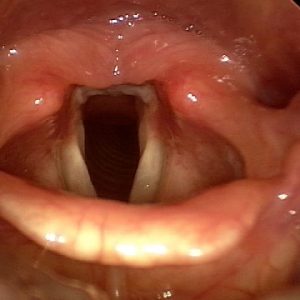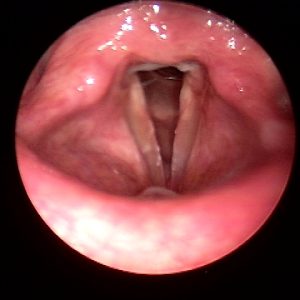
Laryngeal Pharyngeal Reflux (LPR)

Severe Laryngeal Pharyngeal Reflux
The throat is a shared passage where air and food pass during breathing, swallowing, and speaking. Its job is to keep air and food separate, and it has built-in protections—through its structure, nerves, and immune responses—to help keep us healthy. When stomach contents accidentally flow up into the throat, it is called a Laryngeal Pharyngeal Reflux Event. If this happens repeatedly, we call it Laryngeal Pharyngeal Reflux Disease (LPRD).
Repeated reflux events in the throat cause symptoms that are different from heartburn. In the throat, patients often notice extra mucus, frequent throat clearing, a feeling that something is stuck in the throat, and a hoarse voice. Unlike the esophagus (which leads to the stomach), the throat is very sensitive to both acid and non-acid reflux. This sensitivity is why many people with LPRD experience chronic cough, spasms, and constant throat clearing. Sometimes, these symptoms cause more trouble than any direct injury from acid.
Diagnosing LPRD can be tricky because mild cases may look similar to other conditions that cause throat irritation and clearing. In severe cases, the diagnosis is easier to make. When the signs are mild, doctors might try a trial of medication and recommend changes in diet and lifestyle to see if the symptoms improve. Both acid and non-acid reflux can harm the throat; for example, bile reflux can be just as damaging. Most medications for heartburn work by reducing acid production but do not stop reflux from happening. That is why diet and lifestyle changes—like avoiding certain foods, weight loss, and not lying down too soon after eating—are very important.
Recent research also shows that the healthy bacteria in the upper gut and better stomach emptying help protect the throat from reflux. This means that keeping your gut healthy and reducing stress can be key parts of managing LPRD. Stress raises cortisol levels, which can make the throat more sensitive to reflux. Many doctors also use medications like proton pump inhibitors (PPIs), antihistamines, or alginates (like Gaviscon) to help reduce symptoms, but these drugs work best when used alongside lifestyle changes. Most patients can control their reflux symptoms with ongoing lifestyle management and simple diet guidelines.